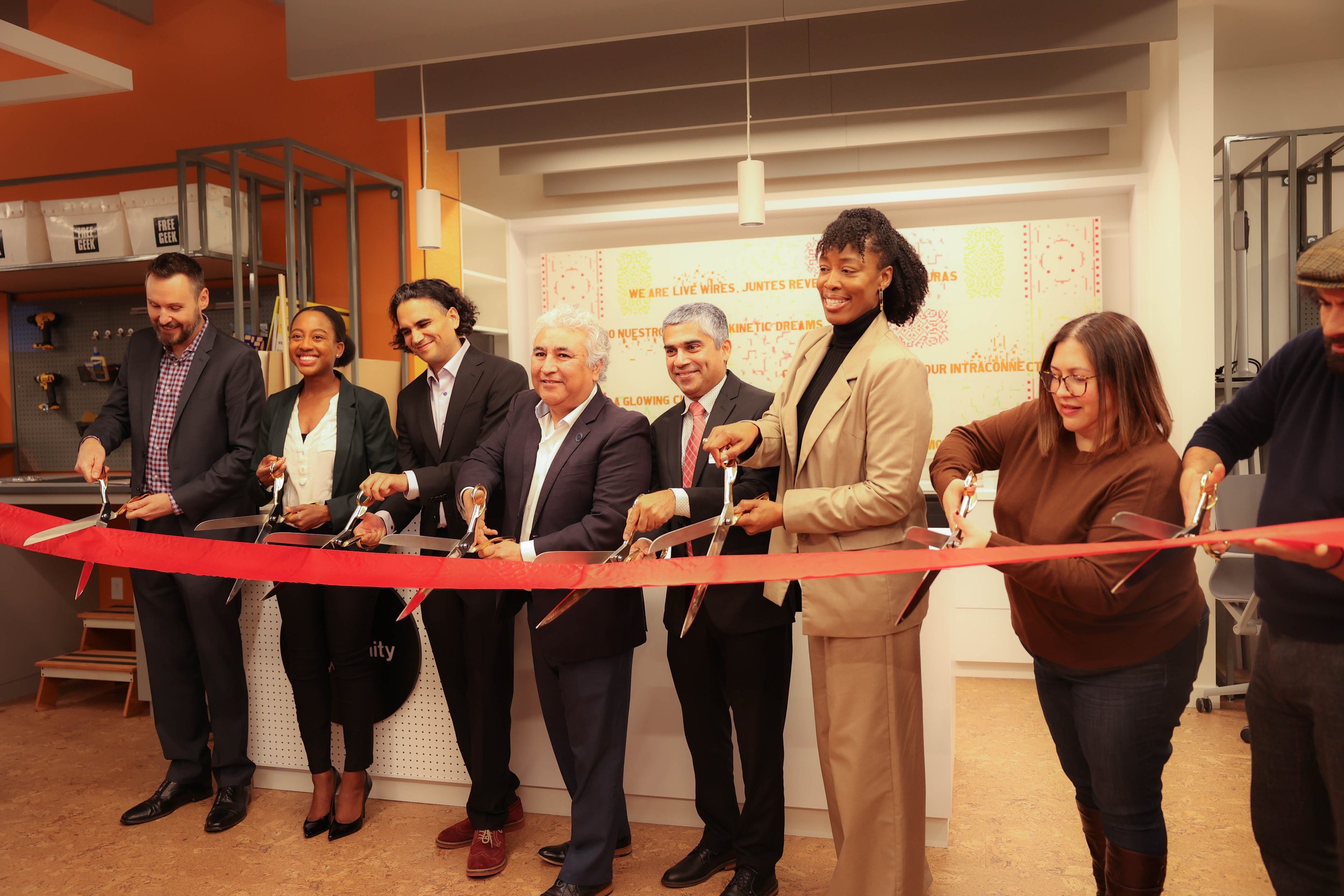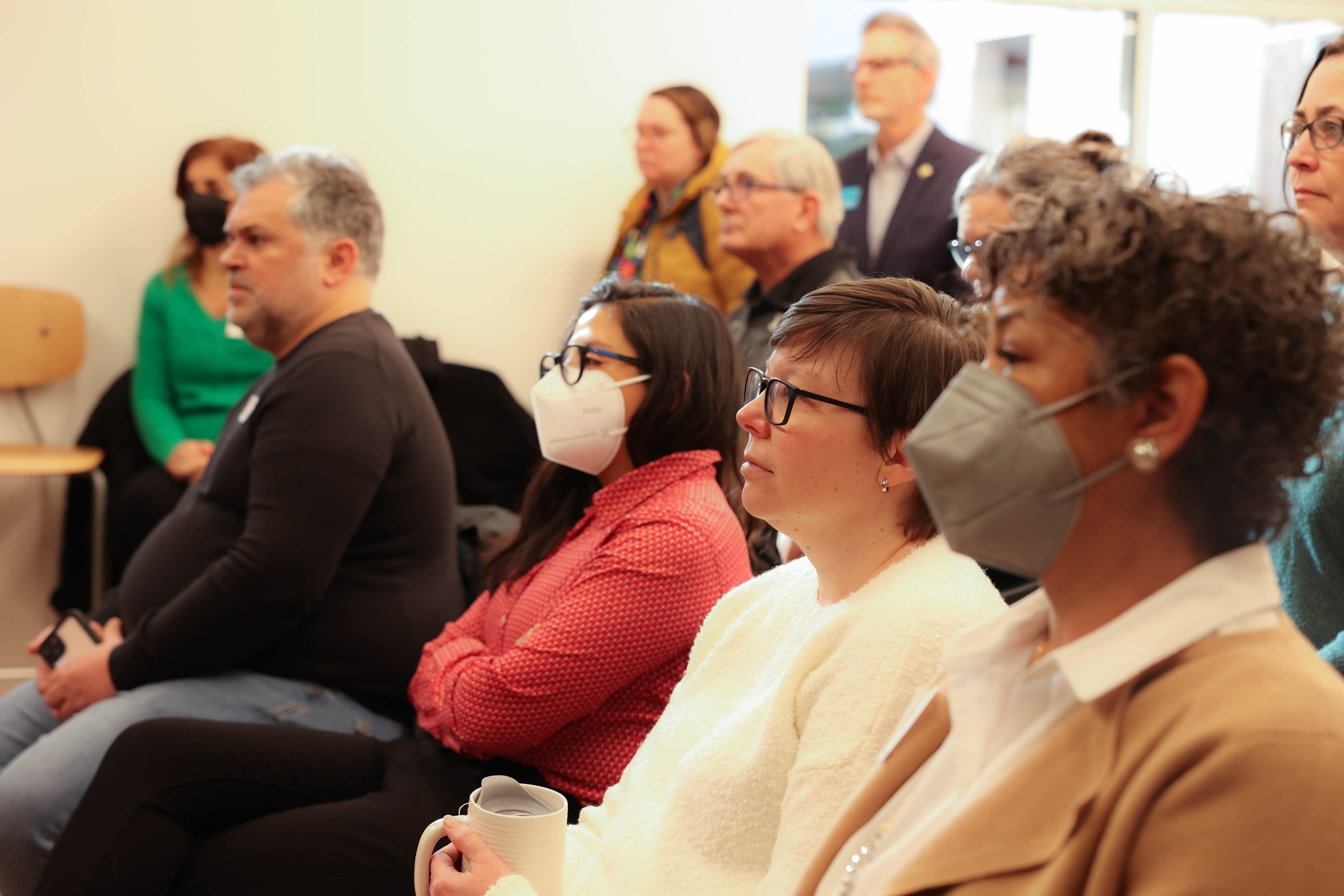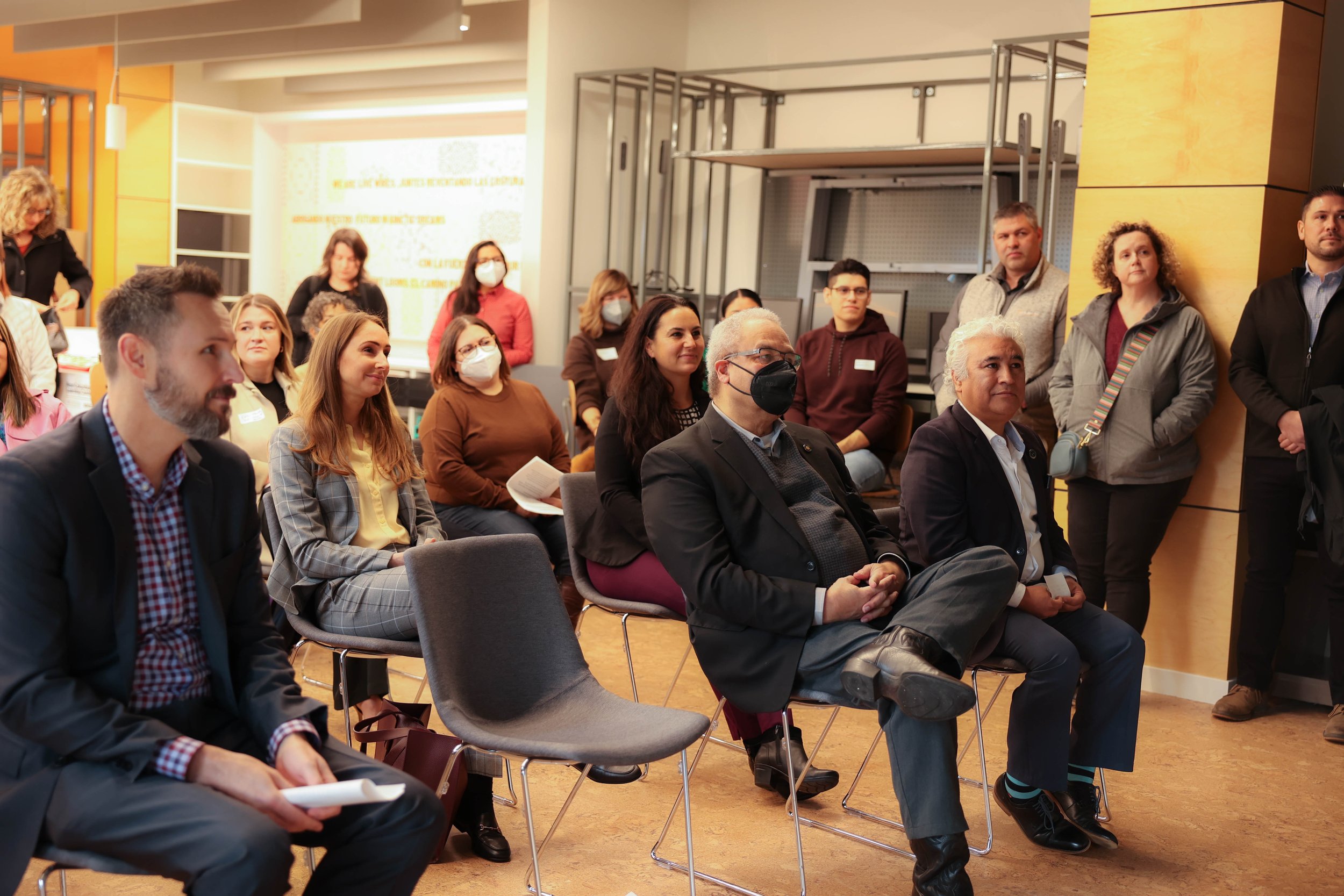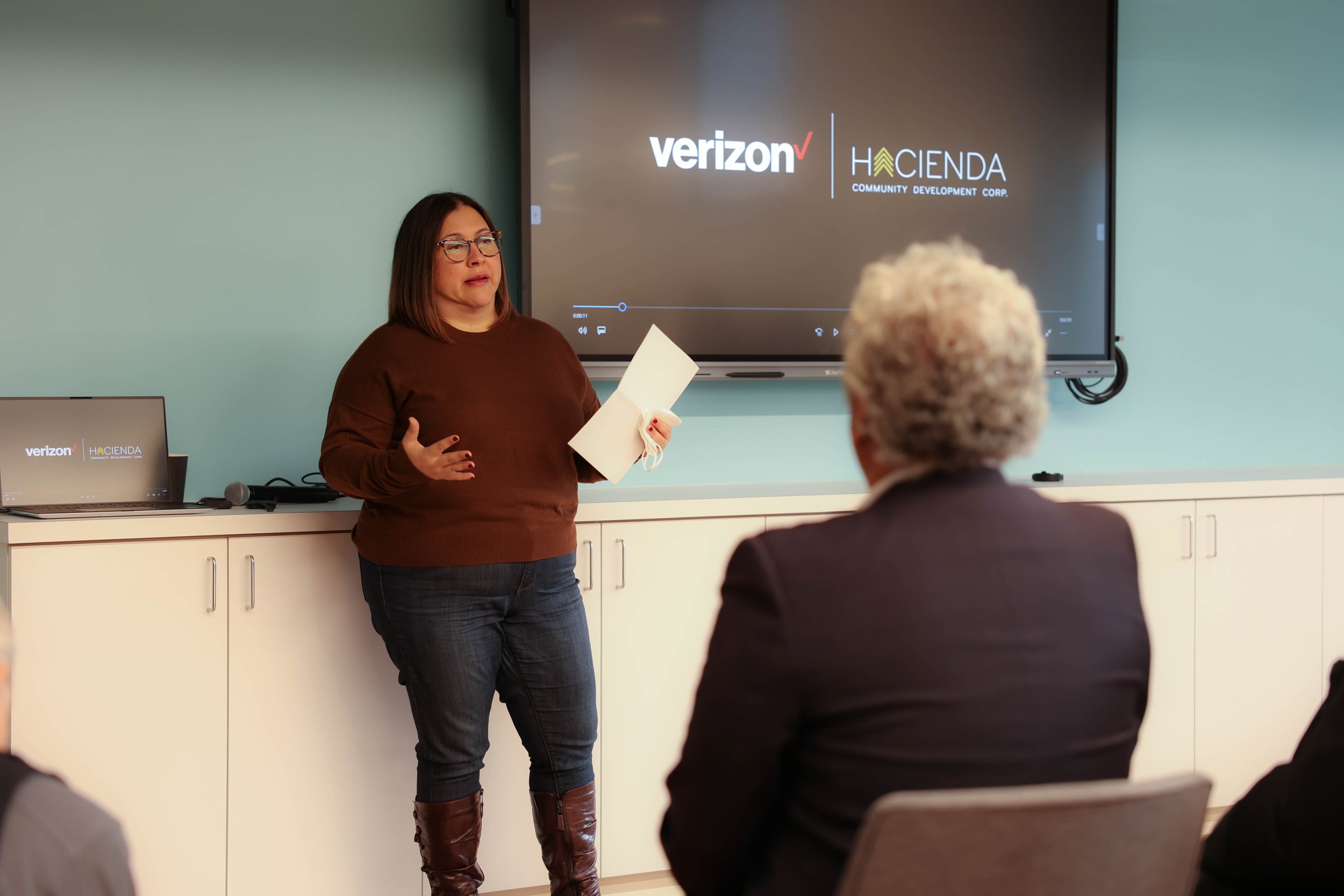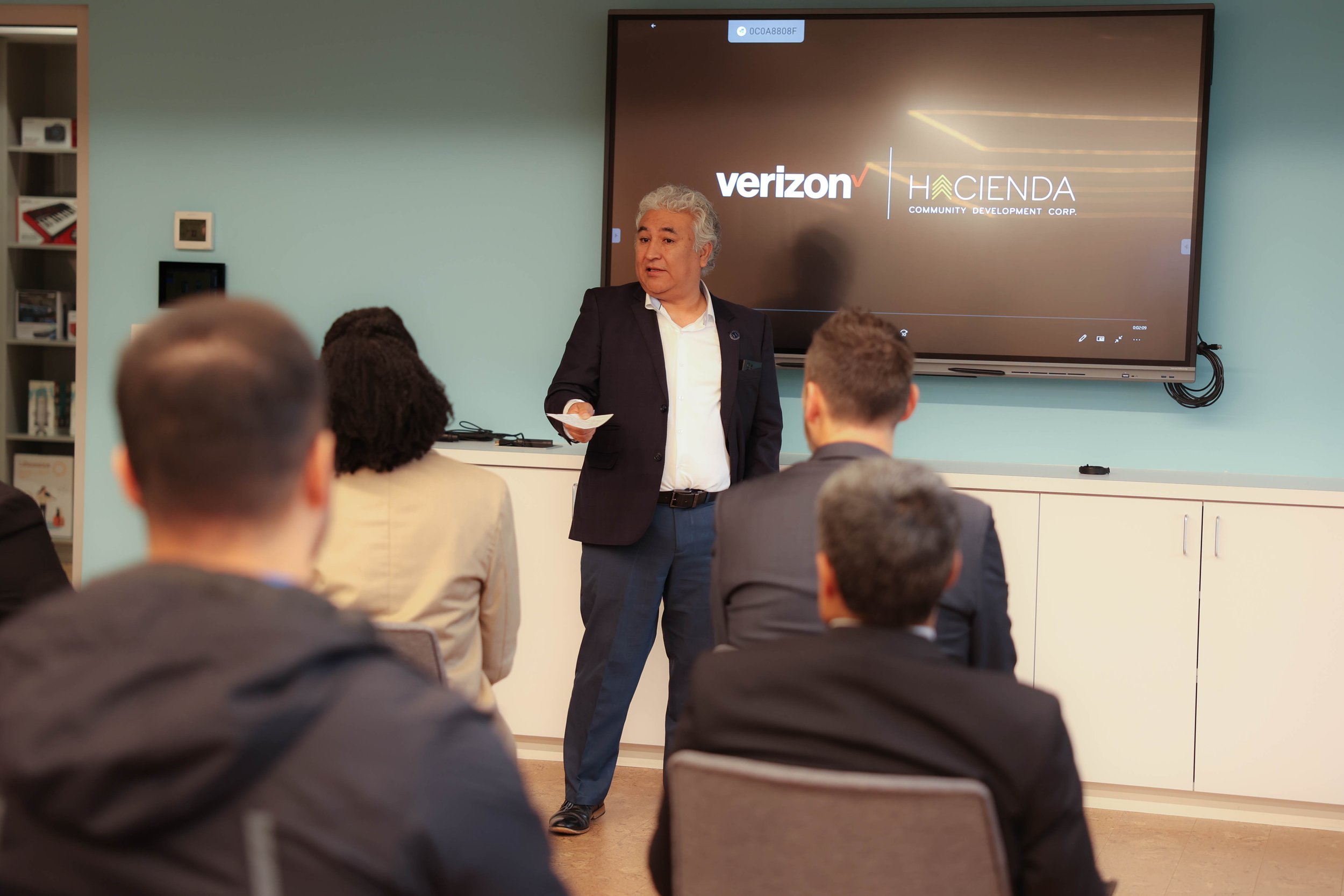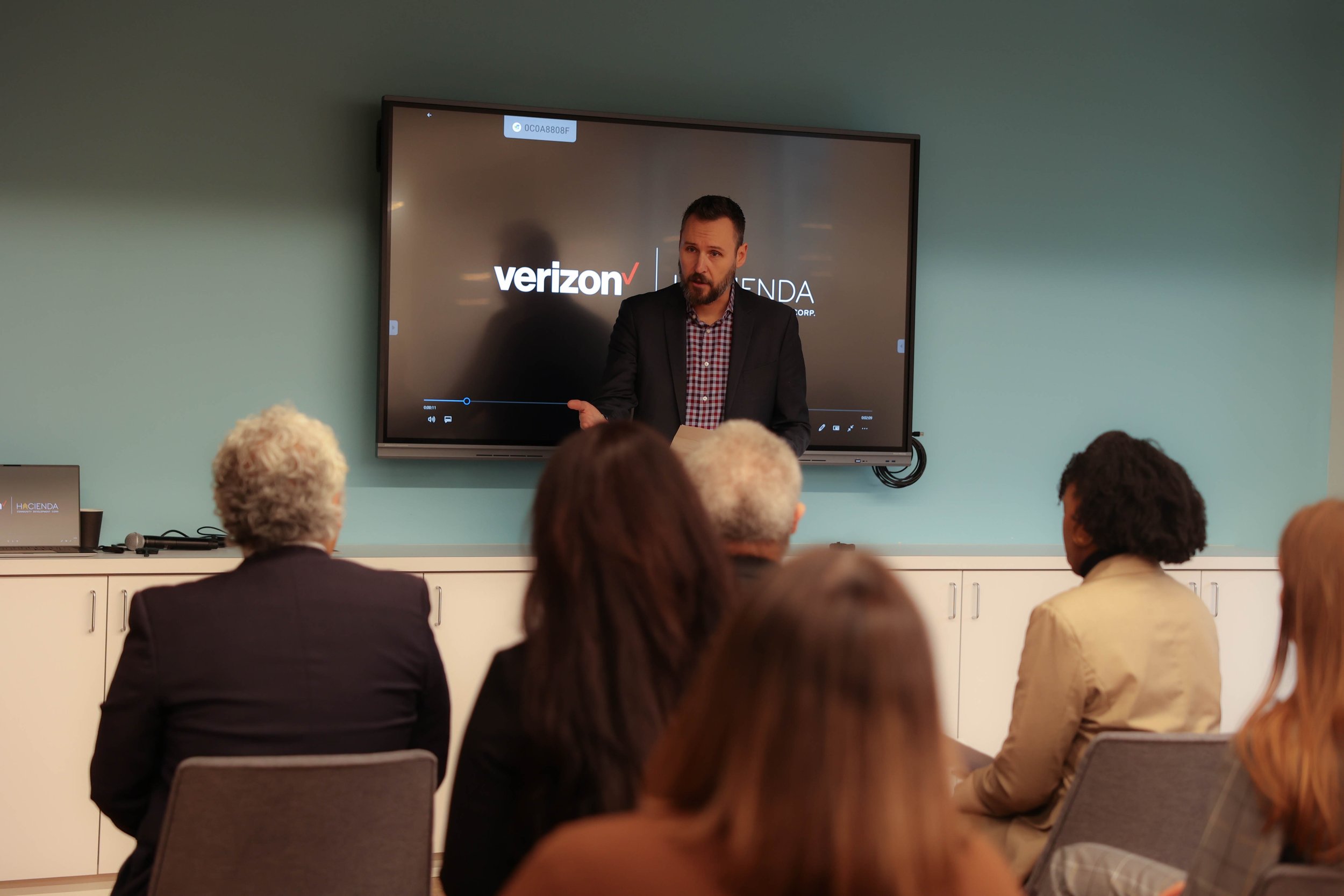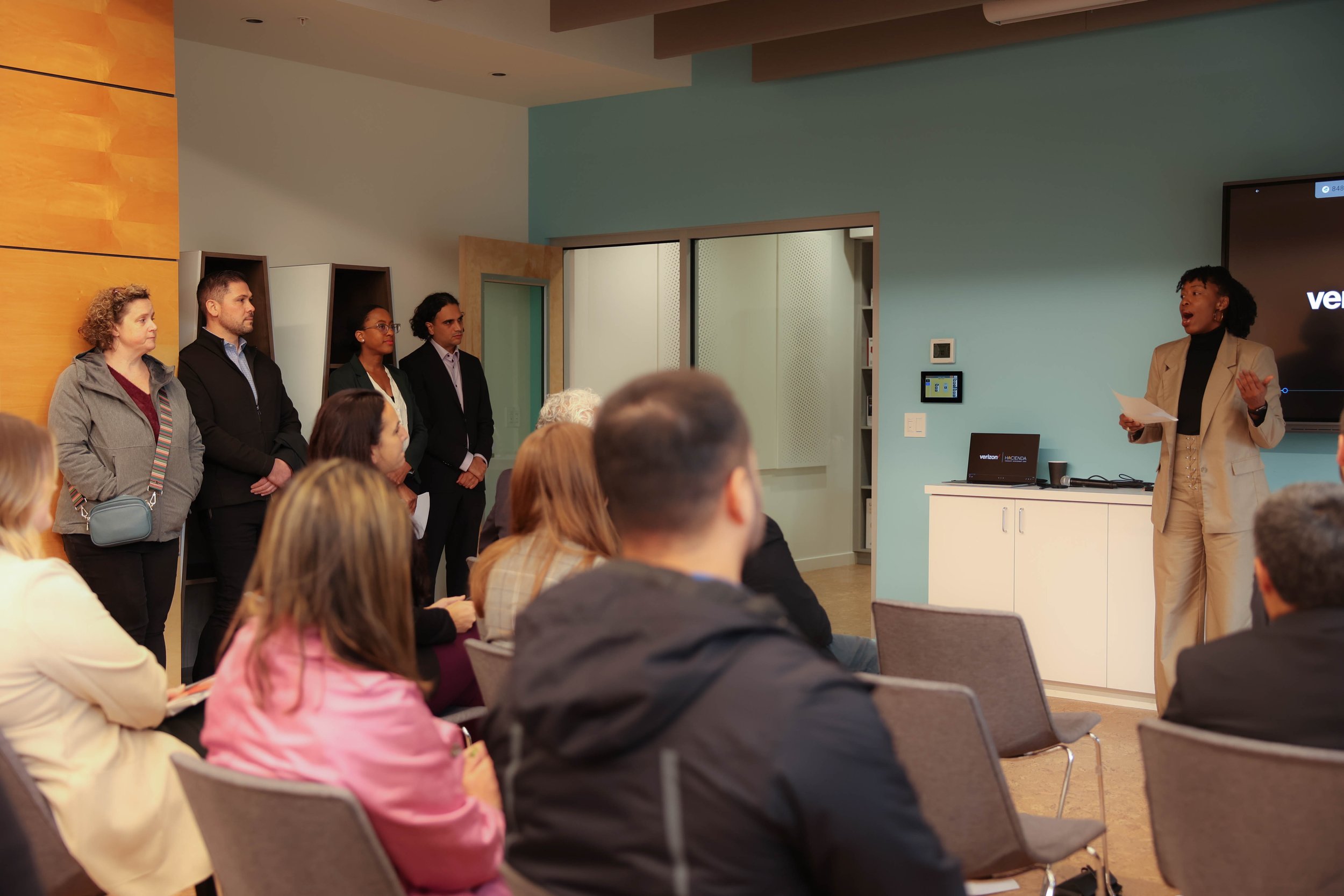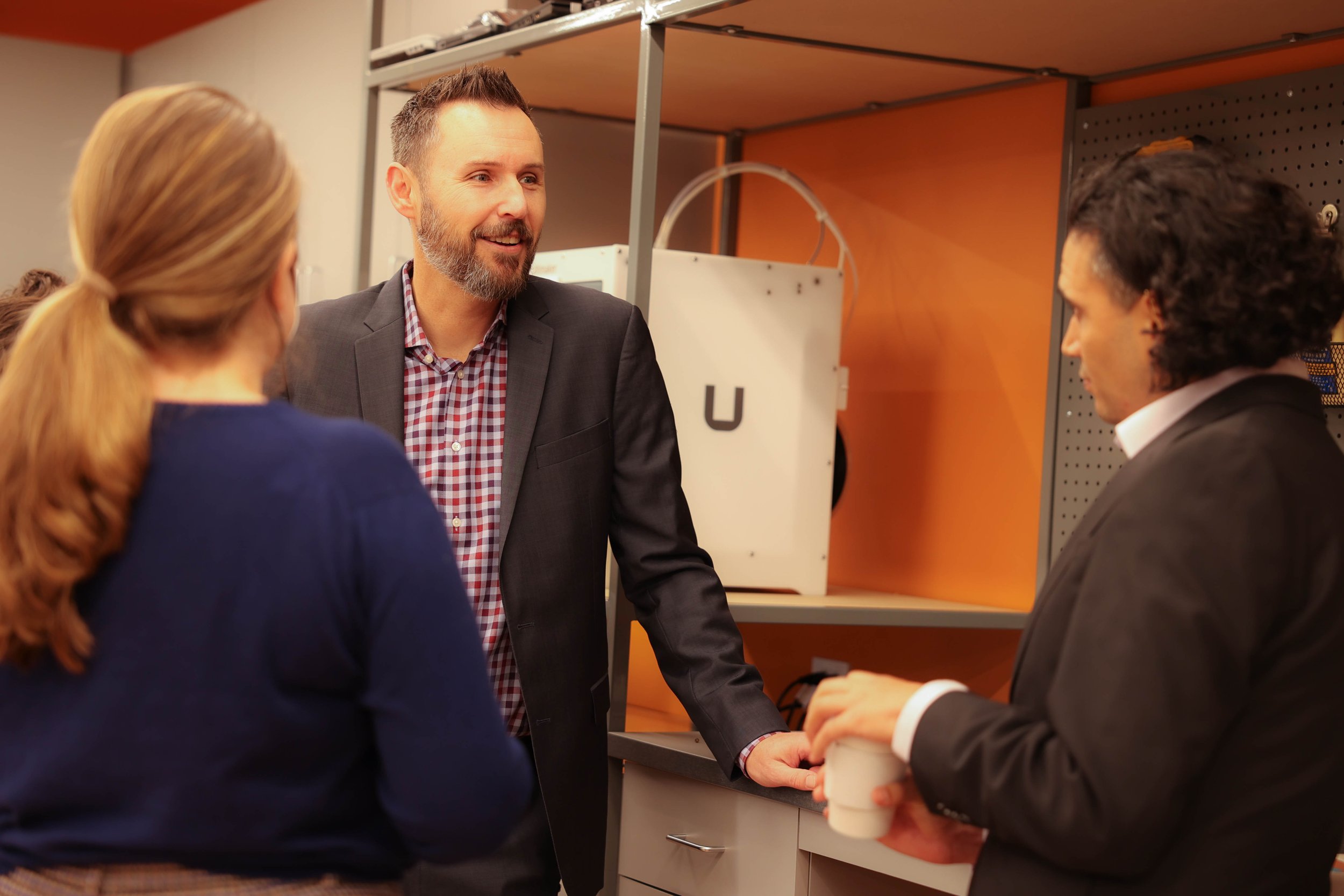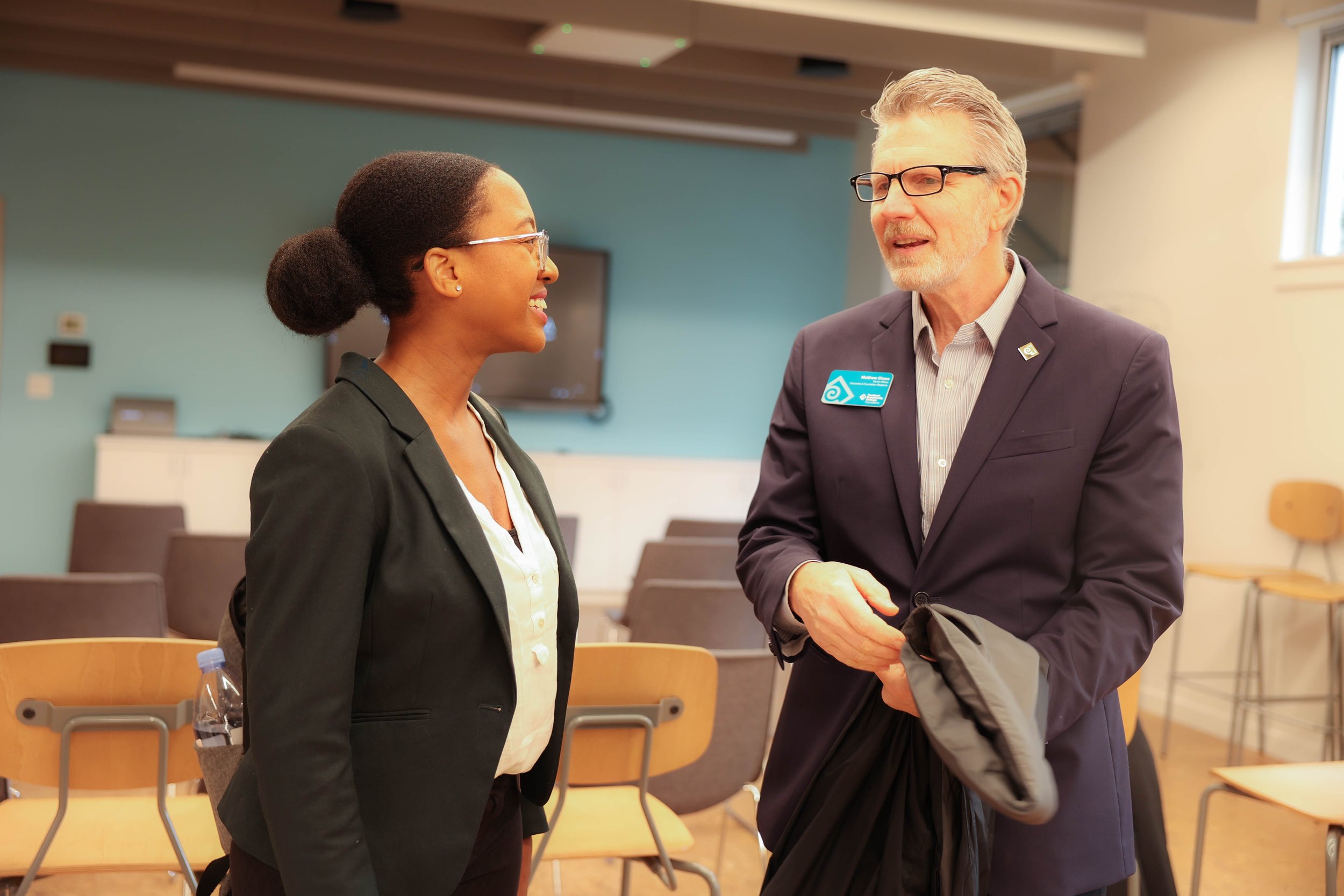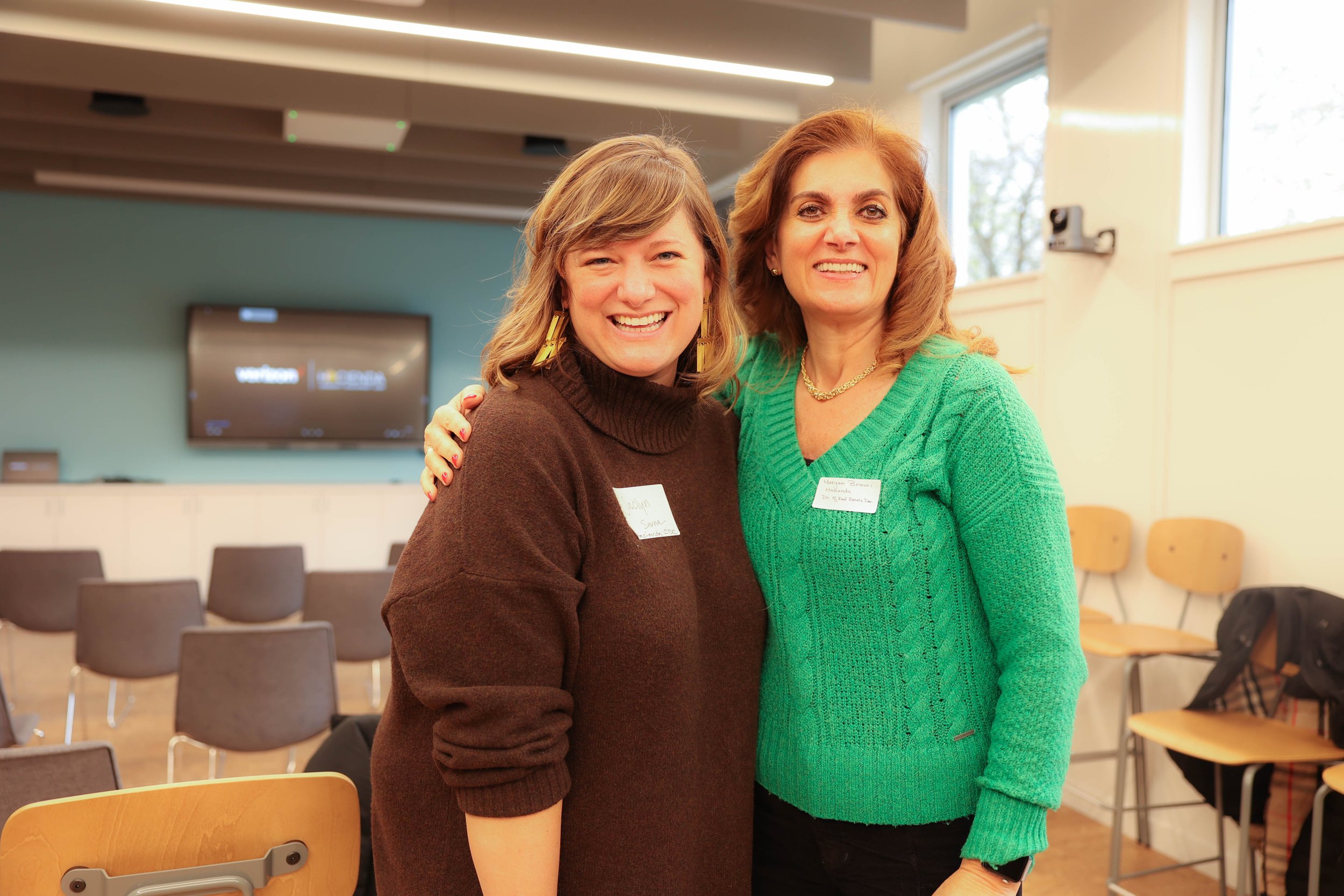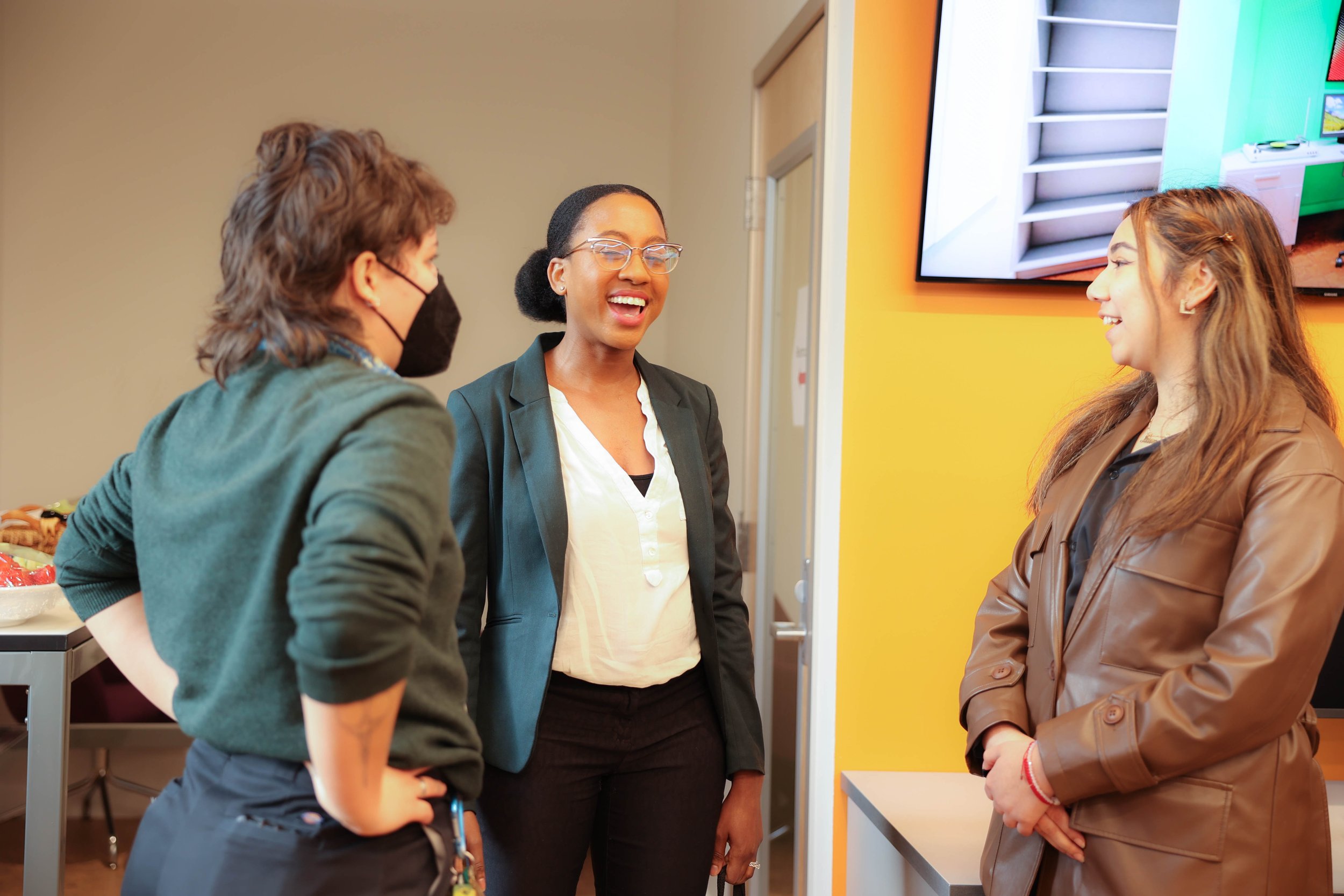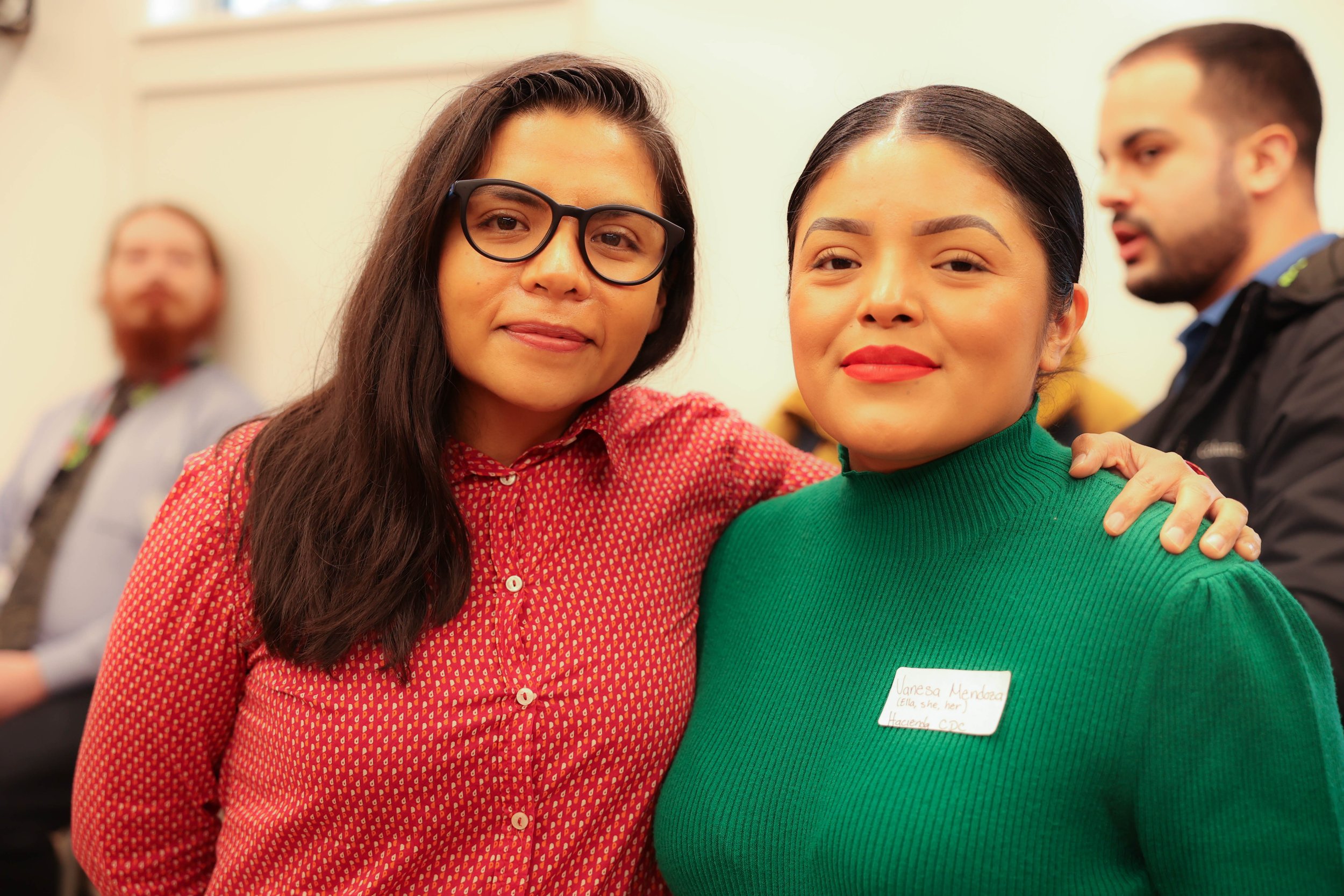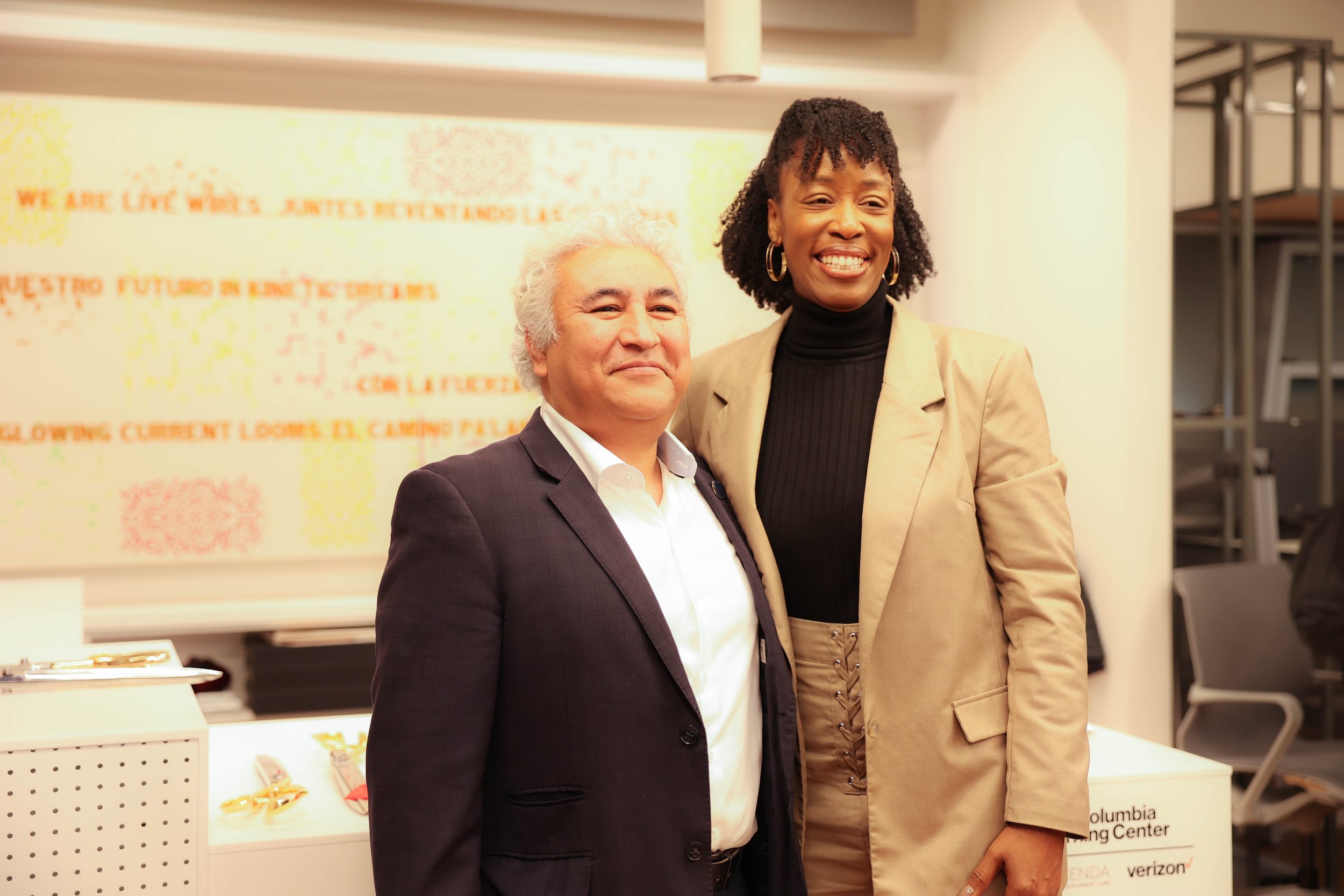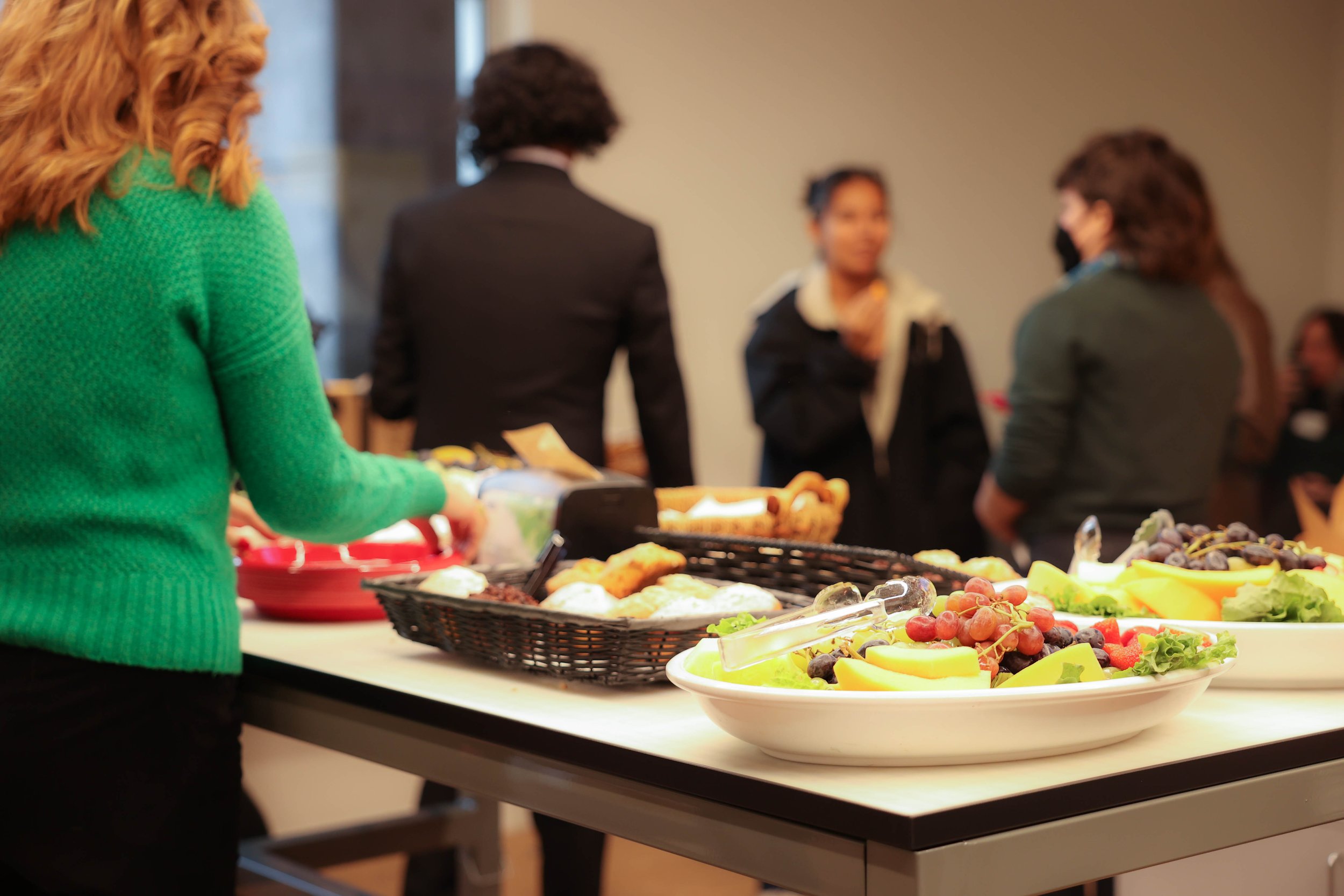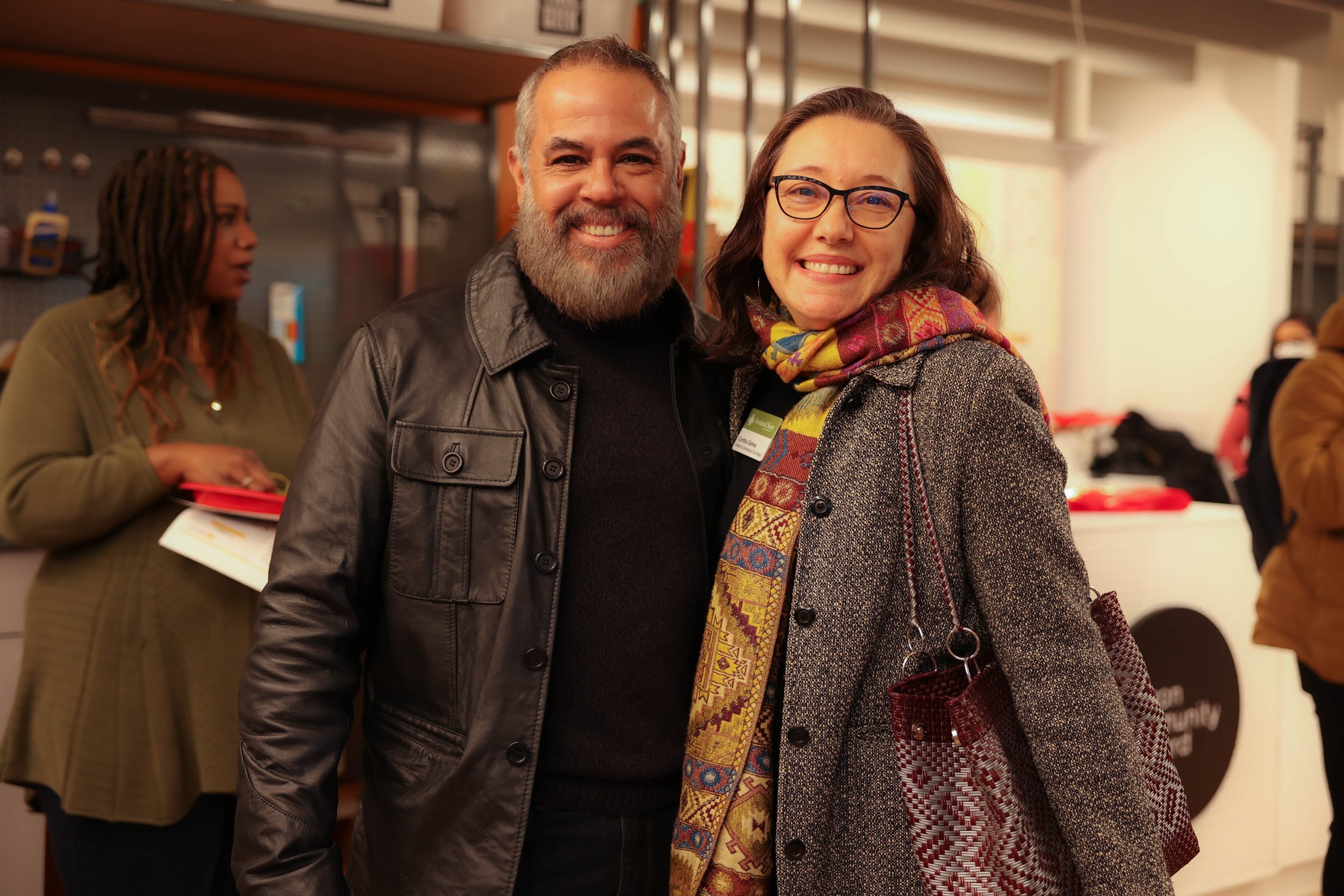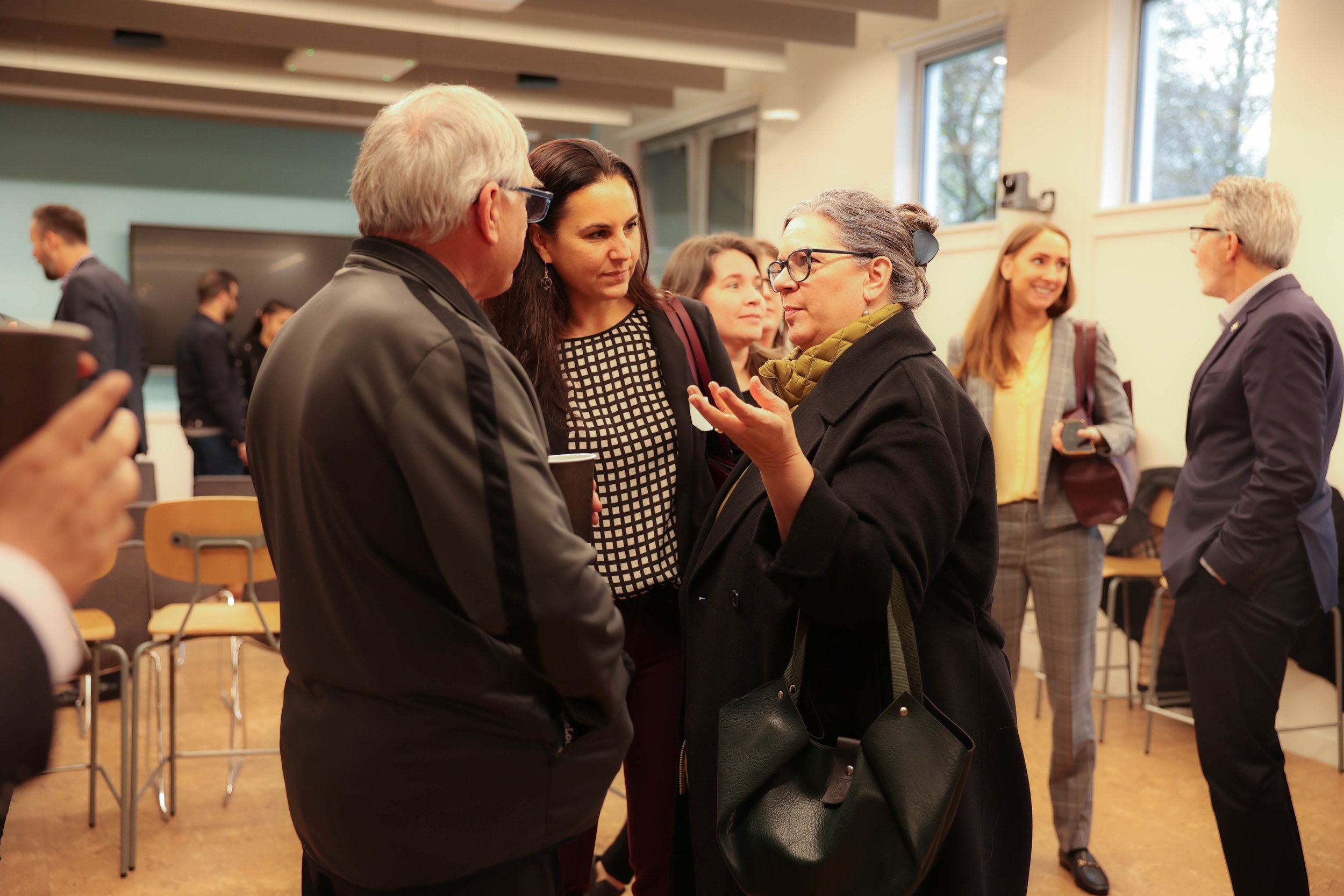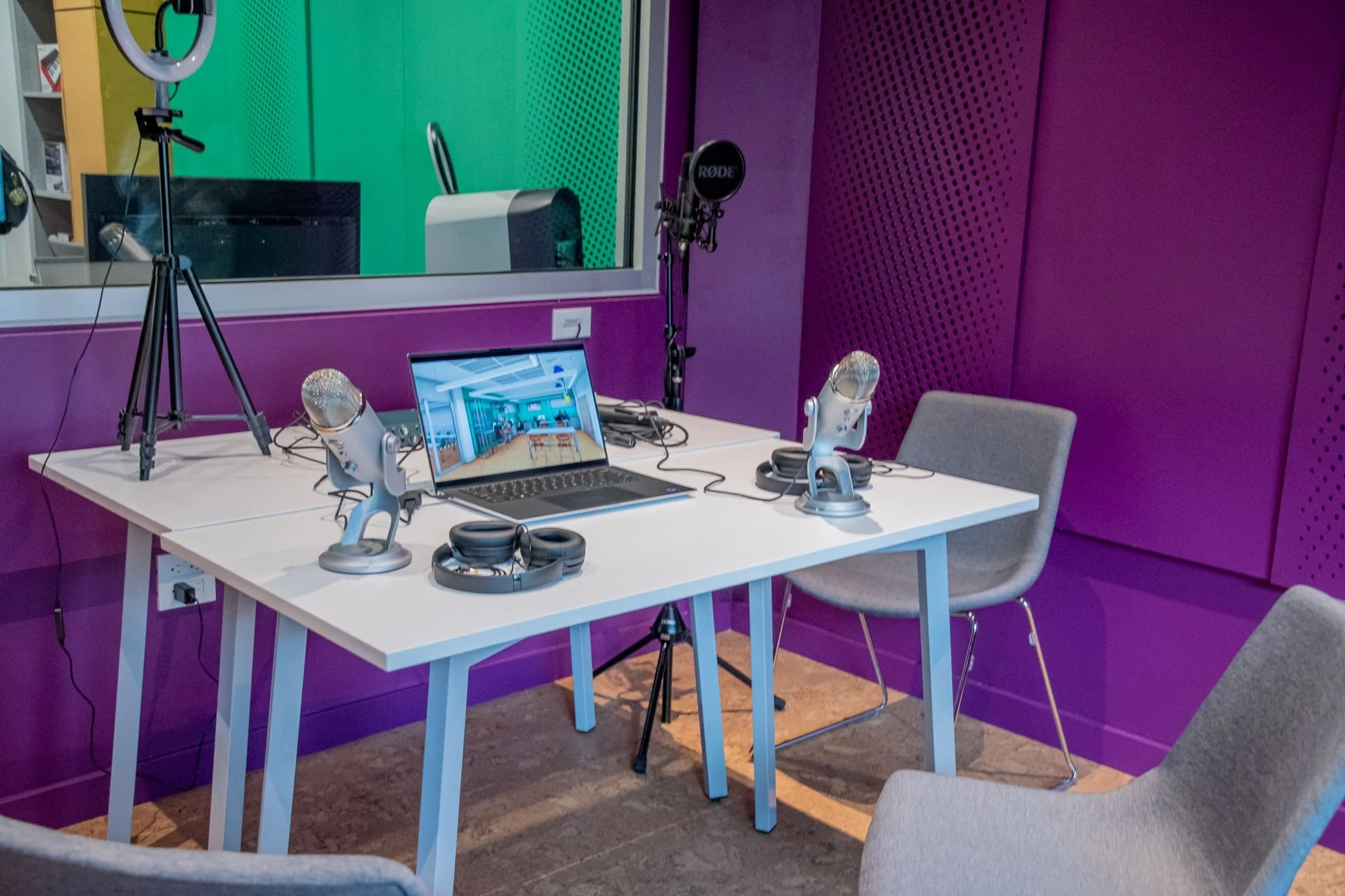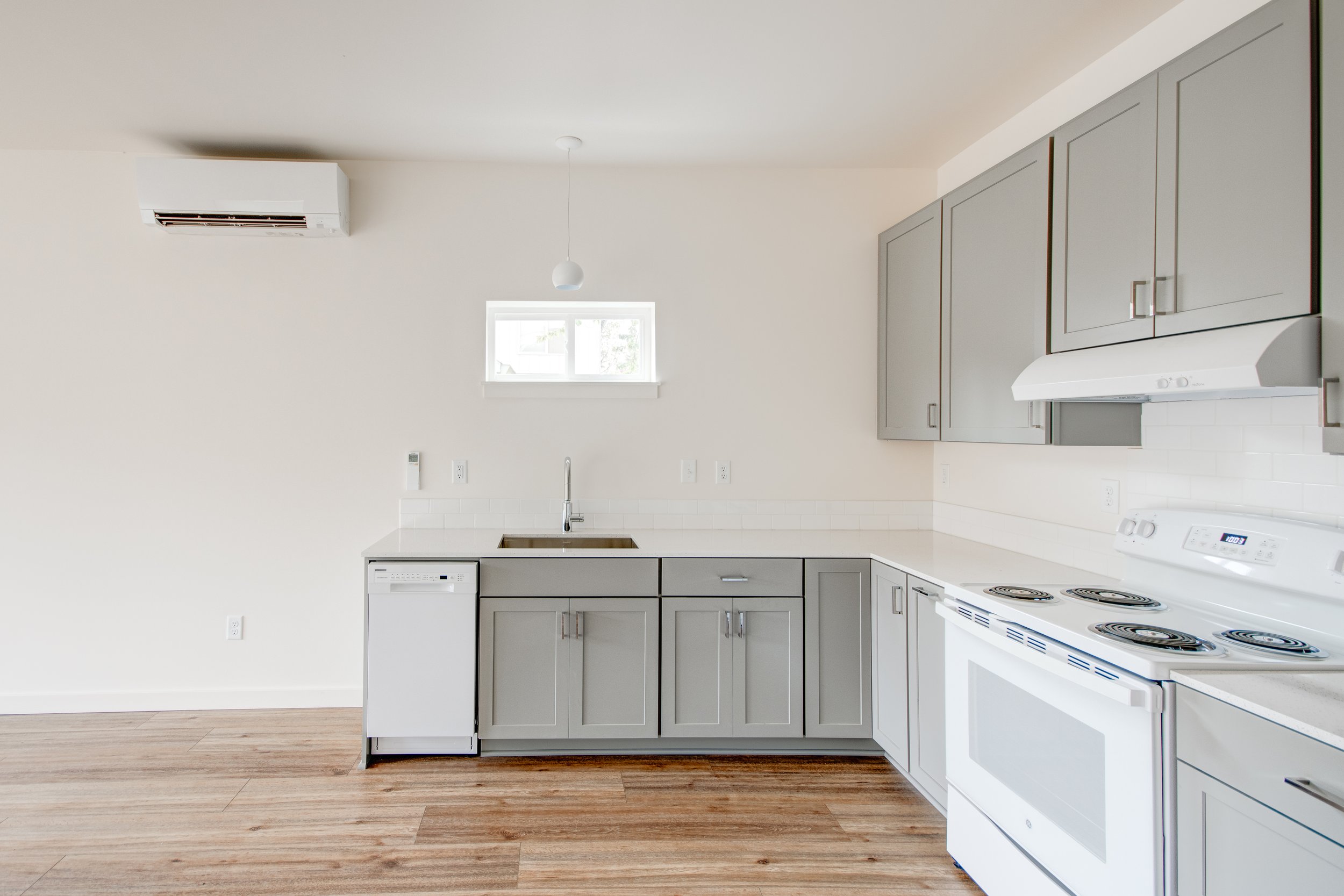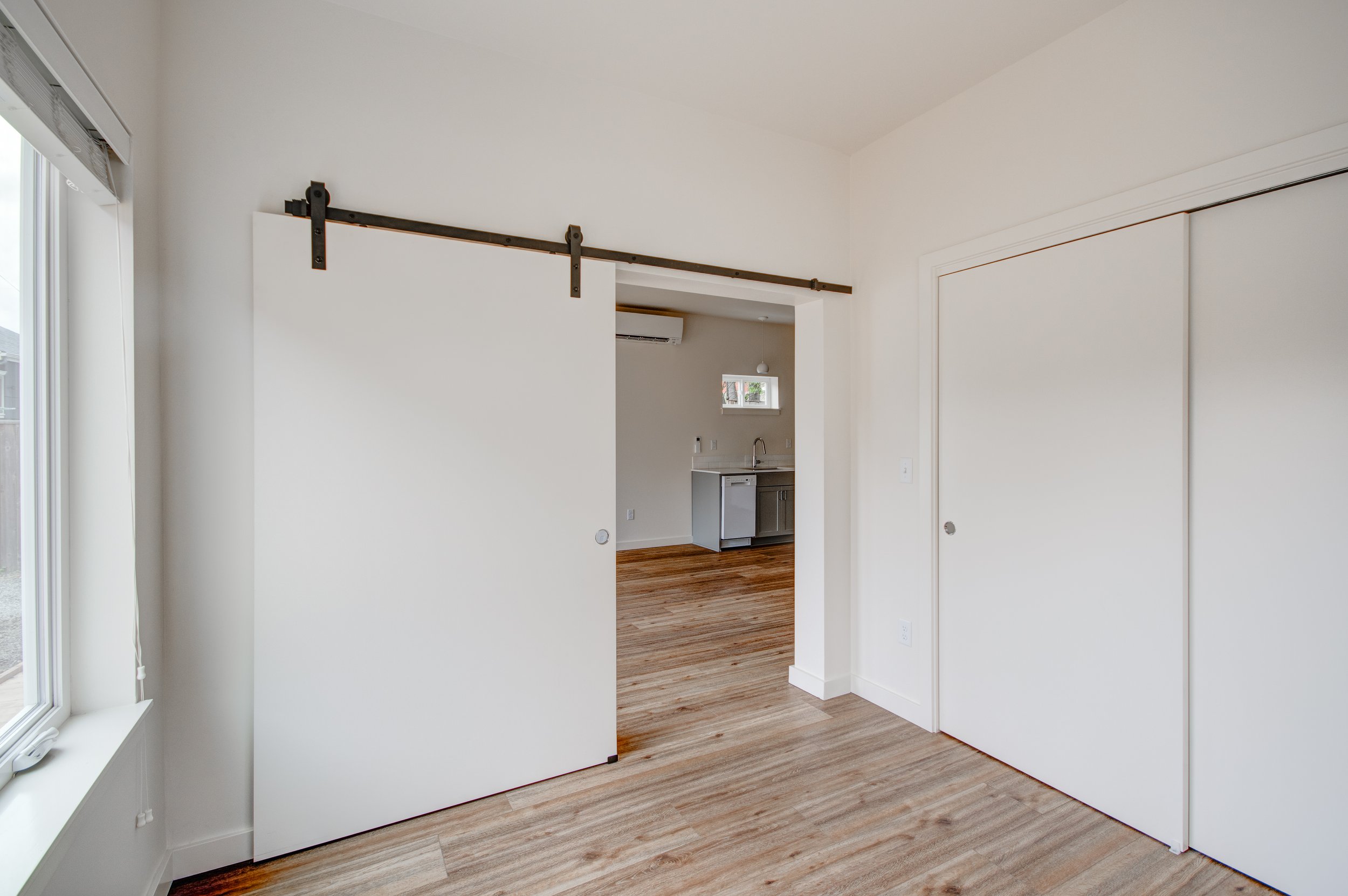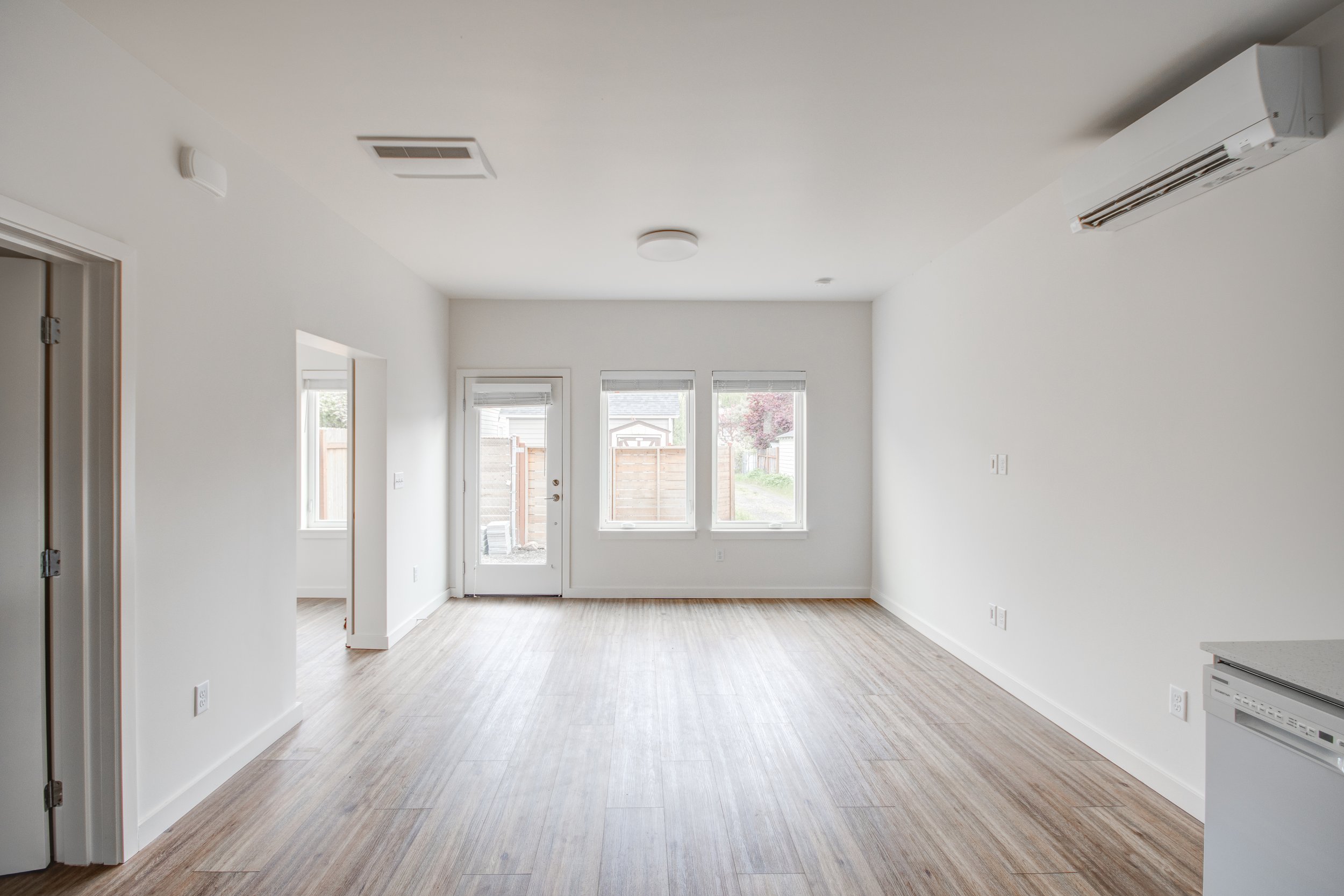Manuela and her family are owners of Loncheria Los Mayas, a staple food cart in the Cully neighborhood, located at Alder Commons. Read more about how she and her family found housing, after-school support, and got on the path to starting their business thanks to support from Hacienda’s affordable housing and holistic programming.
Manuela moved to Portland and hoped to find a safe, affordable space for her husband and three children to live in. Her and her family eventually made it happen when they moved into apartments in Northeast Portland, but soon began facing troubles when their home did not provide adequate living conditions. Her youngest son developed asthma from the walls in their home. This situation caused worry and concern and Manuela knew they would have to move elsewhere to ensure the health of her children.
Although Manuela recognized the necessity to leave their home for the safety of her family, affordability was a priority. Up until that point, she had heard through friends and neighbors about Hacienda CDC and knew about the various programs and services. Community members encouraged Manuela to look into the possibility of renting through the community development organization as it would offer her the opportunity to live in a better environment at a price she and her family could afford. Soon, Manuela and her family of five were welcomed to one of Hacienda’s communities.
Slowly but surely, Manuela regained much-needed hope and began to look into additional Hacienda programming. In doing so, she learned about Expresiones; an after-school and summer enrichment program for youth in Hacienda communities. Even though Manuela helped her three children in whichever way possible, due to her busy schedule and limited schooling in Mexico, she knew she needed additional support for their academics. Her daughters soon obtained on-site homework help from bi-lingual and bi-cultural staff that understood them and their community and had a safe place to go spend their time after school.
Both Manuela and her husband Freddy aspired for more and wanted to build something of their own for their family. Since moving to the United States many years ago, they always dreamed of starting their own business and fulfilling this desire. With a goal and ambition in mind, they began saving to pursue this life-long dream. They soon found it difficult to navigate the many steps of starting a business alone.
“I feel like when you start something big it’s like walking in the dark...Hacienda is a like a light, a beacon, that appeared on the road”
It was at this point that they looked into the Mercado Empresario’s program, Hacienda’s program to support small businesses, from raising captial to business advising and provides bi-lingual and bi-cultural technical support to clients. Once they began the program themselves, they found clarity and a sense of direction to continue on their journey and start their own business with confidence.
In 2016 they opened Loncheria Los Mayas, a food cart in the Cully neighborhood inspired by Manuela and her husband’s indigenous Mexican roots. This one-of-a-kind food cart can be found in Alder Commons where guests enjoy authentic regional foods—from a classic Yucatan Panucho to handmade tortillas. Every dish at Los Mayas celebrates their love for their home country and is a testament to their culture and their dreams.
Loncheria Los Mayas is far more than just a food cart. As Manuela says, “Our dream is to teach people about our culture and traditional flavors originating from the Mayan times.”.
Manuel now encourages others to learn more about Hacienda, as it is more than just proving affordable housing. She that Hacienda supports many facets of a person’s life and reflects on the support she received by saying, “I feel like when you start something big it's like walking in the dark...Hacienda is a like a light, a beacon, that appeared on the road.”
The success of their business embodies the completion of heartfelt goals. It signifies the challenges and perseverance Manuel and her family endured. From leaving their homeland to making their dreams a reality, Manuela’s journey is a roadmap for others looking to reach their dreams and Hacienda is proud to have been a part of her story.
Follow Loncheria Los Mayas on Instagram and pay them a visit at Alder Commons (4212 NE Prescott St, Portland, OR 97218).
The cutting-edge, community-driven Verizon Community Forward initiative creates opportunities for digital access and workforce development, STEM education, digital literacy, and entrepreneurial learning
PORTLAND, Ore., December 1, 2022 — Adults and youth in North, Northeast and Southeast Portland are experiencing new and vital connections to cutting-edge technology, STEM education, and career development opportunities with three community-driven learning centers opening today.
The new centers were created by Verizon in partnership with Hacienda CDC to remove barriers between low-income Portlanders and the tech resources they need to succeed in a digital world. These learning and innovation hubs are designed for all ages, with high-speed internet access, advanced technology, and educational and career programming.
Hacienda CDC and Verizon were joined by Portland City Commissioner Carmen Rubio and guests at the grand opening celebration held at the Verizon Community Forward New Columbia Learning Center on the New Columbia campus of Portland Opportunities Industrialization Center & Rosemary Anderson High School (POIC & RAHS).
"So many families across the nation long for access to the technology and resources they need to be successful in today’s digital world,” says Rudy Reyes, West Region Vice President & Deputy General Counsel at Verizon. “On behalf of Verizon, we are excited to partner with Hacienda and Portland leaders to enable youth and adults to develop the skills, knowledge and capabilities for a more promising future."
Hacienda CDC — In partnership with Verizon, was selected to support the development of three learning centers in Portland. Open to students, community members and the public, the centers are located in remodeled spaces at Hacienda’s headquarters in Cully, Portland Community College’s Southeast Campus, in addition to the New Columbia campus.
“More than 60% of the families Hacienda serves in its affordable housing and programs access the internet only through their smartphones. That’s a huge barrier when you’re trying to participate in school, fill out a job application, or manage your business only through your phone,” said Ernesto Fonseca, CEO, Hacienda CDC. “Latinos, who are a large portion of families served by Hacienda, are among the communities who are under-resourced when it comes to technology. They make up only 8% of STEM workers despite being 18.5% of the U.S. population.”
Known for developing affordable housing throughout metro Portland, Hacienda takes a holistic approach to building communities that goes beyond housing. The new Verizon Community Forward Learning Centers exemplify how Hacienda’s programs and pathways remove barriers to education, careers, and wealth building for low-income families — especially for Latinos and communities of color who historically have been shut out of opportunities.
"I’m committed to closing the digital divide — especially in underserved communities where we see access to technology and tech education is much lower than other communities,” said Portland City Commissioner Carmen Rubio,” I commend Hacienda for its commitment to ensuring that all Portlanders — especially BIPOC, LGBTQ+, and low-income communities and those living with disabilities — have access to government, and a voice in determining their own lives."
The COVID pandemic has only magnified the barriers that low-income households face — like not having internet at home or laptops, desktops and tablets — which unfairly limit their opportunities to succeed at school and at work.
The Verizon Community Forward Learning Centers are helping Hacienda remove those barriers with advanced tech including laptops, tablets, desktops, 3D printers, audio/video recording tools, and more. These resources are coupled with programming offered through partners like Oregon State University, Free Geek and Day One Tech that will help community members use the space and launch opportunities — whether that’s learning to use a computer, developing critical STEM skills and connections to secondary education, or launching a new career or small business.
Schools and community groups who want to use the learning centers can stay tuned to future learning center events at haciendacdc.org/events. For more information on each learning center, visit haciendacdc.org/community.
###
About Verizon
Citizen Verizon is the company’s responsible business plan for economic, environmental and social advancement. Citizen Verizon empowers Verizon to deliver on its mission to move the world forward through action by expanding digital access and resources, protecting the climate, and ensuring people have the skills needed for jobs of the future. Through Citizen Verizon, and the key pillars of Digital Inclusion, Climate Protection and Human Prosperity, the company's responsible business goals include providing 10 million youths with digital skills training by 2030, supporting 1 million small businesses with resources to help them thrive in the digital economy by 2030, achieving net zero emissions in its operations by 2035, and preparing 500,000 individuals for jobs of the future by 2030. Learn more at CitizenVerizon.com.
About Hacienda CDC
Hacienda CDC was formed in 1986 to provide necessary housing and supportive services in NE Portland’s Cully neighborhood. At that time, Cully was home to the largest Latino population in Oregon. Since then, Hacienda has grown to provide affordable housing in 10 communities in Northwest Oregon and provide supportive services to over 1500 individuals, children, and families.
As Portland’s Latino population has grown rapidly, Hacienda continues building capacity to offer our bicultural services to Latinos and other low-income families. Hacienda embraces a holistic approach, providing culturally specific services that provide opportunities to access needed resources like growing or starting a business, and buying a first home. Hacienda is Oregon’s largest Latino-led, Latino-serving housing organization and remains a trusted name in the community.
Program Provides $200,000 in Flexible Funding to Each Organization and Leadership Development Training to Advance Economic Mobility in Portland
Portland, Ore. – Programs and services that address economic mobility and community development in Portland will be able to expand and scale their services, helping more people chart a path toward economic opportunity with help from multi-year grants from Bank of America. Hacienda Community Development Corp. (Hacienda CDC) and Virginia Garcia Memorial Health Center and Foundation (Virginia Garcia) have been named as the 2022 Bank of America Neighborhood Builders® awardees for their work in the Portland Metro region removing barriers and advancing economic opportunity.
Each organization receives a $200,000 grant over two years, comprehensive leadership training for the executive director and an emerging leader on topics ranging from increasing financial sustainability, human capital management and strategic storytelling, joins a network of peer organizations across the U.S., and gets the opportunity to access capital to expand their impact. The program continues to be the nation’s largest investment into nonprofit leadership development. Hacienda has proudly named Andréa Guedes, Hacienda’s Communications and Events Manager, as the 2022 Emerging Leader for this award.
“Nonprofits are vital to community resilience and prosperity. By addressing our critical local needs such as affordable housing and workforce development, they are helping to alleviate barriers so that individuals and families can chart a path toward economic opportunity and stability,” said Roger Hinshaw, president, Bank of America Oregon and Southwest Washington. “It is important that we direct capital, other necessary resources and training to support Hacienda CDC and Virginia Garcia for long-term success so they can continue to grow strategically and address the most pressing needs of our region.”
Hacienda CDC is the largest Latino-led housing organization in Oregon. Their mission is to strengthen families by providing affordable housing, homeownership support, economic advancement and educational opportunities for BIPOC and low-income communities. Hacienda CDC serves over 3,000 community members through affordable housing and a wide array of services such as homeownership classes, after-school programs, and small business advising and technical assistance. They will use their grant funding to launch a new home lending program, which will provide 100% financing for first time-homebuyers that meet participation and income qualifications to provide them with a secure pathway to homeownership.
“We are honored to be the recipient of the Neighborhood Builders grant which will increase our capacity to help community members reach their dreams and goals. For far too long, our Latino and underserved communities have experienced economic hardship and systemic barriers head on; and for the last 30 years Hacienda has been doing the work to provide them with new opportunities and support to build a brighter future,” said Ernesto Fonseca, chief executive officer, Hacienda CDC. “Whether its housing, business advising, and in the near future, home lending, we continue to provide new, innovative pathways that lead to success and stability for our communities. Thanks to investment like the Neighborhood Builders grant, we can continue to deepen our impact and look towards a brighter future for all.”
Virginia Garcia is the largest non-profit community health center in the state that ensures high quality, comprehensive and culturally appropriate access to health care for those who need it most. Virginia Garcia serves more than 52,000 patients in 18 clinics across Washington and Yamhill counties, providing primary care, dental care, pharmaceutical services, and more. They will use their grant funding to expand their new Virginia Garcia Healthcare Workforce Training Program, focused on medical assistants and dental assistants, and help pilot an expansion to include pharmacy technicians.
“We are grateful to Bank of America for their tremendous partnership and support of our Workforce Development efforts. These programs allow us to support staff and community members from our target populations as they start or advance their careers right here at Virginia Garcia. This generous funding will help us restore and rebuild our care teams, whose dedication in the face of all challenges, keeps our mission alive,” said Stefanny Caballero, executive director, Virginia Garcia Memorial Foundation.
In Portland, 29 nonprofits have been selected as Neighborhood Builders since 2004, with the bank investing $5.4 million into these local organizations.
The invitation-only program is highly competitive, and organizations are selected by a committee comprised of community leaders and past Neighborhood Builders honorees.
Since 2004, Bank of America has invested over $280 million in 50 communities through Neighborhood Builders, partnering with more than 1,400 nonprofits and helping more than 2,800 nonprofit leaders strengthen their leadership skills. Neighborhood Builders is just one example of how Bank of America deploys capital in communities, builds cross-sector partnerships, and promotes socioeconomic progress as part of its approach to responsible growth.
NOVEMBER 16, 2022
NEWS RELEASE
Contact: Shawn Uhlman, Prosper Portland, 503-823-7994
Portland City Council has voted 5-0 to approve the creation of the Cully Tax Increment Finance district and adopt the Cully TIF District Plan for one of the city’s most culturally and ethnically diverse communities.
An Exploration Leadership Committee (ELC) made up of community-based organizations and Cully residents, along with staff from Prosper Portland and the Portland Housing Bureau (PHB), co-created the Cully TIF District proposal in a four-year process that centered historically underserved, marginalized, and underrepresented community voices.
ELC partners included Native American Youth and Family Center (NAYA), Our 42nd Avenue, Cully Boulevard Alliance, Verde, Cully Association of Neighbors, Hacienda CDC, Habitat for Humanity Portland Region, and Cully community members at large.
These partners came together in 2018 with the stated goal to turn the traditional urban renewal district creation process upside down, to ensure the funds are focused on benefiting the very people who have historically been displaced by these projects. They presented the idea to Prosper Portland and PHB who agreed to work with them.
The Cully TIF District Plan, Report and Governance Charter are the products of multiple years of co-creation among City staff and the ELC as well as extensive community outreach. The vision for the work is to transform Cully into a place that provides a sense of belonging for its residents, particularly for priority communities.
More specifically, that vision encompasses plentiful safe, affordable housing, thriving Black, Indigenous, and People of Color (BIPOC)-owned businesses, rewarding employment opportunities, safe and accessible transportation options, parks and open spaces, a clean and healthy environment, and climate resiliency, with places and programs that reflect the cultural diversity of BIPOC individuals.
The newly adopted Plan will guide future five-year action plans and establishes the project list, a list of legally eligible housing and economic development project types for future TIF investment that will help move the community toward its vision. TIF spending will be administered under the guidance of the Community Leadership Committee. The city will hold an open application process to recruit committee members in the spring; action planning, the process by which specific investment priorities are identified, will kick off next summer.
Quotes from partners:
Chach M. Heart, mobile home resident, Community Engagement Committee member, and ELC member: “[I’m] proud of the work we have done and inspired to see what this community will create collaboratively with this funding.”
Mayor Ted Wheeler: "I am deeply impressed by the level of partnership and collaboration that went into developing this new TIF district, which will guide more than $300 million in public investments in Cully over the next 30 years. These resources will fund affordable housing and economic development projects that will help address some of the displacement pressure that Cully is facing, and advance other community priorities."
Paul Lumley, Native American Youth and Family Center: “We’re proud of being a part of creating a new model of collaboration, partnership, and dialogue between the community and the public sector. We look forward to continuing to work with the Cully community and partners to implement their priorities while upholding the plan’s vision, values and principles.”
Commissioner Dan Ryan: "Prosper Portland and the Portland Housing Bureau have led a collaborative effort in partnership with the Cully neighborhood community to take a fresh approach to TIF districts. The Cully TIF district represents a 30-year vision for the neighborhood's future and continued success of this project requires deep neighborhood involvement, and the community must persist as the glue that implements this just and ambitious vision. I see the fire in the belly of the Cully community, I have confidence they are committed for the long term, as such, I am enthusiastic about the Cully TIF district."
Kimberly Branam, Prosper Portland: “We believe this collaborative model of district development and priority setting is the future of TIF, and we appreciate the historic action taken by City Council. While we recognize this new district is not a panacea, we do look forward to working in partnership with the Community Leadership Committee to achieve the vision for Cully.”
Maddie Norman, community engagement and research coordinator with Living Cully: “People who have been doing anti-displacement work in Cully said, what if we can use this tool that’s caused harm, instead, to stabilize? And we have created a way that we think that can happen.”
Tracee Wells-Bryant, Training and Education Specialist at PCC Workforce Development Center and ELC member: "As Franklin D. Roosevelt said, 'The test of our progress is not whether we add more to the abundance of those who have much; it is whether we provide enough for those who have too little.’”
Molly Rogers, Portland Housing Bureau: “This is a historic opportunity to use our resources in a new way to support a community-led vision for Cully that is equitable, inclusive, and vibrant. Affordable housing investments early on in the life of the district will be critical to preventing displacement and ensuring that existing Cully residents can share in the benefits and opportunities these investments will generate. We look forward to working in partnership with the community to create housing opportunities that reflect the needs of one of our city’s most diverse neighborhoods.”
Elizabeth de Jesus, Community Engagement Leader, Cully TIF ELC member: "I appreciate that this plan supports people of color and low-income people, and they don't focus on their status. It betters our community, especially kids. Our community is tired of false promises. We want to make sure our community is receiving what we ask for so the community can have trust."
Steve Messinetti, Habitat for Humanity Portland Region: “Redefining urban renewal for the nation, such that it is for the people, by the people! This is historic. Everyone who put the hard work and long hours into this should be very proud.”
David Sweet, ELC member representing the Cully Association of Neighbors: “This TIF district is unique in that it was conceived and led by the Cully community. We set out to find the resources to prevent displacement from Cully. Now we can work with the City to make that happen.”
This season, Hacienda supporters can make their gift go farther and enjoy some benefits along the way.
The Winquist Family will match every donation up to $10,000!
And, the first 50 donors to Hacienda CDC will receive a $6 gift card to Nico's Ice Cream!
Ready to make your gift? Click the donate button below!
Your donation helps build community.
Watch the video below to hear directly from residents of Hacienda’s Rockwood Village.
But Wait! There’s more!
Donate to Hacienda on a Big Give Day and you'll be entered to win one of several prizes. Learn more about the prizes here.
Thurs, Nov 3 - An e-bike giveaway from Splendid Cycles.
Weds, Nov 9 - Three prize packages from the Portland Trail Blazers.
Thurs, Nov 17 - Four $250 gift certificates from Atlas Tattoo.
Weds, Nov 23 - Two $500 gift cards from Powell's Books.
Tues, Nov 29 - (This is also Giving Tuesday) - One-night stay at Salishan Coastal Lodge.
Weds, Dec 7 - A shopping spree and product giveaway from New Seasons Market.
Thurs, Dec 15 - Four Cotopaxi Allpa Travel Backpacks stuffed full of of gear.
Weds, Dec 21 - A Trek Bicycle package courtesy of Portland's Trek Bicycle stores.
Weds, Dec 28 - Five $200 gift cards from John's Marketplace.
Thurs, Dec 29 - Two $500 gift cards from Portland Nursery.
Fri, Dec 30 - A Mt. Hood – Timberline Lodge Experience package thanks to the Cultural Trust.
Follow us on social media and set your notifications to never miss a BGD!
Over the past two years Hacienda has worked quickly to meet the urgent needs of our community during the COVID-19 crisis. Read the infographic below to learn about our work to support the health of our community.
Hacienda’s community card is a new initiative that will enable you to seamlessly access programs and services in Hacienda’s network. Read more to learn about this card and its benefits.
About the Community Card
Hacienda’s affordable housing and holistic programming have supported our residents and broader community since 1986. During that time, we have grown to over ten communities with thousands of residents and community members.
Our growing impact requires innovative new systems that increase access to our array of programs and services. The new Community Card initiative will provide Hacienda’s current and future clients with a seamless way to access our programs with the scan of a single card.
This card can currently be used to access to our bi-weekly food pantry, transit assistance, and our state-of-the-art Learning Centers. In the future, Hacienda's Community Card will be implemented in additional Hacienda programs.
Why a Community Card?
This new initiative allows residents and community members to seamlessly access our array of holistic programming with the scan of a single card. The Community Card allows Hacienda to centralize our program intake process and support accurate and efficient data collection while ensuring a positive client experience.
A pilot of the Hacienda Community Card began in June 2022 and has been successfully implemented with over 100 community members. Through this pilot we learned that the Community Card created a better client experience, improved accuracy of information collected, and increased engagement within other Hacienda programs that currently accept the Community Card.
Where can I get one?
Register for a Hacienda Community Card at a Learning Center near you or visit our bi-weekly food pantry at the Hacienda headquarters to receive a card and gain seamless access to our services.
What information is collected?
Hacienda’s Community Card gives us insight into individual and community trends so that we can do our best work.
When requested, demographic and programmatic trends may be shared with partners that support Hacienda CDC’s work. Information collected via the Community Card will only be distributed as numbers and trends that broadly demonstrate the impact of our work. Individual information is confidential and never shared with third parties.
How To Use the Community Card
(New Users)
Receive a card from a Hacienda employee
Click
“I need to register”
Fill out Intake form
Scan the QR code to finish registering!
How to Use the Community Card
(Returning Users)
Click
“Check-In”
Select method for check-in
Scan the QR code or enter your unique pin and
follow the prompts on screen to check-in!
Effective September 1st Hacienda CDC offices will be closed on Fridays. Existing clients, partners, and funders have been notified of the upcoming change. read on to learn more about this initiative.
Hacienda CDC is proud to announce a four day, 32-hour workweek pilot for our 56 employees effective September 1st, 2022. This initiative aims to support Hacienda’s team in prioritizing their wellbeing and build sustainable work-life balance as they continue to put the needs of the individuals and families we serve at the forefront. Hacienda remains committed to maintaining high-quality services for its residents and community members and looks forward to the positive benefits offered by this alternative work schedule.
A host of data demonstrates the benefits of a 32-hour work week on staff wellbeing, productivity, creativity, and retention. Hacienda CDC hopes that this change will bring lasting impacts to its existing and dedicated workforce, to the organization, and to the community we serve.
This initiative spearheaded by top leaders at the organization will begin September 1st. In anticipation of this change Hacienda CEO, Ernesto Fonseca remarks, “I am proud to work with a team that is as dedicated and driven as the group we have at Hacienda. Our team takes care of community members, often treating them like family, and now is our opportunity to do the same for our staff. We are excited to pilot a 32-hour work week and we hope this pilot will demonstrate that investing in our team’s wellbeing can bring lasting positive impacts on the work that we do collectively.”
This change follows an unprecedented pandemic, throughout which, employees in all sectors reflected on the importance of work/life balance, family, and security. Hacienda’s pilot is an effort to support existing staff and their wellbeing as they champion the needs of individuals and families across Northwest Oregon.
“We know that this will take some time to adjust, but we are hopeful that the benefits will outweigh the learning curve of implementing this initiative. Our current and prospective clients will continue to be served to our fullest abilities and efforts.” Says Carolina Castañeda del Río, Chief Operations Officer at Hacienda CDC.
With this initiative Hacienda CDC is redefining what work can look like during a time when individuals and organizations have been forced to innovate and adapt to changing tides. Hacienda hopes others in Oregon will take innovative steps to support their team’s wellbeing and be inspired by similar initiatives that have been successfully implemented around the world.
Hacienda CDC is proud to announce funding from the Portland Clean Energy Fund—the first ever climate fund in the country created and led by people of color.
This investment in Hacienda’s MEE Casa initiative will provide cleaner air, increased comfort, better health, reduced financial burden, and improved social outcomes by upgrading six multifamily affordable housing communities with a total of 243 units.
These upgrades will positively impact over 1000 low-income residents in our communities, 92% of whom are people of color. The project includes removing gas-powered heating, installing solar arrays totaling 849.5 kW, heat pumps and cooling devices where needed, as well as LED lighting, and new bathroom fans. An average energy savings of almost 70% is expected for residents.
This MEE Casa initiative aims to reduce the consumption of fossil fuels and related greenhouse gas emissions, improve indoor air quality, and support the well-being of over 1,040 members of our resident communities, including 473 children. The vast majority of our residents identify as black, indigenous, and people of color (BIPOC) and all households earn 60% of Area Median Income and below.
The MEE Casa initiative will directly benefit these historically underserved communities and give them the opportunity to directly benefit from climate action investments that will build a stronger Portland.
This $9.4 million investment is critical to providing green and healthy affordable housing in North and NE Portland and includes solar power installation; new cooling and heating units; transition to all energy efficient electrical systems and appliances; heat pump water heaters; LED lighting and bathroom fans.
Hacienda CDC will implement the project over a four-year period with our strategic partners Neil Kelly Company, International Center for Appropriate & Sustainable Technology (ICAST), PAE Engineers, and the Oregon Environmental Council.
“We are thrilled the PCEF Committee is recommending Portland City Council fund this investment which will improve the lives of over 1,000 people. We feel strongly that this is the exact type of investment the Portland Clean Energy Fund was created for– improvements that will measurably decrease energy consumption and increase the quality of life for Portland’s community members.”- Ernesto Fonseca, Chief Executive Officer of Hacienda CDC.
Residential buildings account for one-third of Oregon’s climate emissions. Retrofitting existing buildings is critical to meet decarbonization goals and create green and healthy homes and communities.
Low-income and underserved communities bear the burden of rising temperatures and climate-driven events such as heat domes and wildfires associated with a warming planet. As a Latino-founded and led organization that is an owner and steward of affordable housing and community building, Hacienda CDC is a leader on this front and is committed to increasing the well-being and resiliency of our communities.
Hacienda CDC places the health and well-being of residents front and center, especially now as the warming climate becomes a threat to their well-being. Investments made through the MEE Casa initiative will improve their safety and comfort, resulting in healthier and more resilient households. The implementation of this initiative will allow residents to not only feel supported and secure enough to successfully navigate their day-to-day lives but to also advocate and champion preventative climate-related investments after feeling the benefits of such policies firsthand.
Overnight cooling shelters opening Tuesday at 2 pm
Charles Jordan Community Center: 9009 N. Foss Ave., Portland
East Portland Community Center: 740 S.E. 106th Ave., Portland
Portland Building: 1120 S.W. 5th Ave., Portland
Sunrise Center: 18901 E. Burnside, Portland
Daytime cooling center opening Tuesday, from 2 to 10 pm
Old Town: 435 N.W. Glisan St., Portland
Transportation
TriMet will not turn away anyone riding to a cool place who cannot afford to pay fare. TriMet asks riders to let their driver know they are headed to a cool place.
When riding transit during extreme heat, riders will want to plan extra time and check trimet.org/alerts before traveling, as there may be heat-related delays to service.
Anyone who needs transportation support to a cool space can also dial 2-1-1 (866-698-6155).
Libraries Many libraries are open until 8 p.m.
Extended hours until 9 p.m., Tuesday through Thursday:
Central: 801 S.W. 10th Ave.
Gresham: 385 N.W. Miller Ave.
Holgate: 7905 S.E. Holgate Blvd.
Misting stations
12 pm to 8 pm starting today (Tuesday 7/26):
East Portland Community Center: 740 S.E. 106th Ave.
Glenhaven Park, near skate park: 7900 N.E. Siskiyou St.
Harney Park, near restroom: S.E. 67th Ave. and S.E. Harney Street
Knott Park, west restroom: N.E. 112th Ave. and N.E. Russell Street
Lents Park, at Walker Stadium: 4808 S.E. 92nd Ave.
Mt. Scott Community Center, near playgrounds: 5530 S.E. 72nd Ave.
Community spaces, including Lloyd Center
Community locations, including pools, splash pads, senior centers and Lloyd Center mall, which is welcoming people with extended hours starting Tuesday : Interactive Map of Cool Spaces
The Joint Office of Homeless Services supply center is providing water, electrolytes, sunscreen and more for groups doing outreach. Email JOHSSupplies@multco.us for an appointment.
Hacienda CDC and Community Vision, a local organization working to dismantle barriers to housing options and gaps in services for people with disabilities, have completed construction on the first Small Homes Northwest ADU in Portland, Oregon.
Tracy, Community Vision staff member hands keys to Amy, the first Small Homes Northwest resident.
The first resident of the Small Homes Northwest Project has received her keys and moved into her new ADU (Accessory Dwelling Unit) after years of seeking the independence a home of her own would offer.
Amy, the first resident of the ADU pilot project, and an existing client of Community Vision’s housing access program is thrilled to finally have a place to call her own.
For decades Amy lived with roommates; giving up on the dream of independent living. “I just didn’t think this dream would come true,” she says. She is excited about the new opportunity of living in a brand-new dwelling that she can call her own.
Hacienda CDC’s Small Homes Northwest Project develops ADUs on existing residential properties to rent to people in need of local and affordable housing options. This model provides much-needed housing to community members and build wealth-generating opportunities for modest-income homeowners.
This first ADU, built in partnership with Community Vision, an organization that “provides services, education, and advocacy to ensure that people with disabilities direct their own lives,” was built behind an existing home owned by the organization with hopes of building new units as a less costly way to provide affordable housing to their clients.
Courtesy of Mitchell Snyder Architecture
“One of the things that’s incredibly exciting for us about the ADU opportunity is, for many people with disabilities, they dream of having their actual own place; a house, unfortunately, is not affordable for most.” says Jennifer Knapp, Executive Director at Community Vision.
An ADU requires a smaller amount of capital and subsidy than typical apartment units while increasing the demographic and socioeconomic diversity of residential neighborhoods, which studies show increases the social cohesion, tolerance, and fair-mindedness of a community.
“People are coming by to say hello already,” says Joe Wykowski, Founder and now Strategic Housing Outreach Consultant of Community Vision. He shares that local residents are supportive of the ADU development and have given their new neighbor a warm welcome.
This first ADU with Community Vision was funded in part by the Kuni Foundation and the pilot stems from years of planning spurred by funding from Meyer Memorial Trust and the Oregon Legislature. Soon, the Small Homes Northwest Project will open ADU development to homeowners’ backyards.
“I hope that the Small Homes Northwest project can provide economic prosperity for those that live in these spaces, and I look forward to seeing more of these units developed to not only provide a new beautiful building for property owners but also support the urgent housing needs in our community.” Remarks Ernesto Fonseca, Chief Executive Officer of Hacienda CDC.
Click here for more information about Hacienda’s Small Homes Northwest initiative.
During the 2021 Oregon Legislature Special Session the Port of Portland and Hacienda CDC received a $5MM grant to prototype the design, development, and installation of volumetric mass timber modular housing. Through this prototype exercise, Hacienda CDC, Design Consultant and Construction Company will design and develop modules that can stand alone as a single floor studio or through a combination of two, three or four modules a two-to-three-bedroom modular volumetric house.
Hacienda CDC requests qualifications from contractor services for the construction of mass timber modular housing.
Through this prototype exercise Hacienda CDC, Design Team and Construction Company will design and develop modules that can stand alone as a single floor studio or through a combination of up to four modules a two-to-three-bedroom modular volumetric homes.
This type of module made with mass timber products will be one of the first in the nation. Join us in building innovation and industry in Oregon!
The deadline for submissions is June 10th.
Questions? Email modularhousing@haciendacdc.org
Portland's new Street Response program has gone citywide. This program sends teams of paramedics and mental health professionals to respond to people who are experiencing a mental health crisis, instead of sending armed police officers.
The program started off last year in the Lents neighborhood, and has now expanded to the entire city, including Cully.
If you come across someone who is experiencing a mental health crisis or who is intoxicated and needs support, please consider calling on Portland Street Response instead of the police. You just call 9-1-1 like you normally would, and ask them to send Portland Street Response.
This service is available every day 8:00am-10:00pm. Street Response teams can come to public places, including stores and public areas of businesses, but not private homes. Here is more information on the program:
https://www.opb.org/article/2022/03/28/portland-street-response-oregon-mental-health-crisis/




